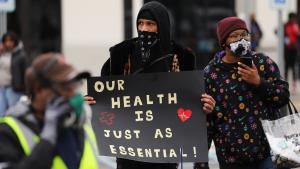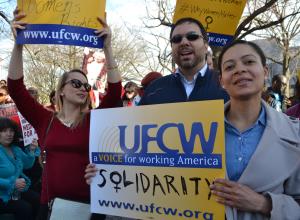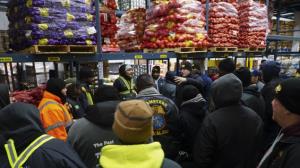 Concern over COVID-19 and its impact on essential, relatively low-paid workers has enabled the Teamsters Union and other unions including the United Food and Commercial Workers Union to negotiate increased pay, benefits, and protection during the ongoing COVID-19 pandemic.
Concern over COVID-19 and its impact on essential, relatively low-paid workers has enabled the Teamsters Union and other unions including the United Food and Commercial Workers Union to negotiate increased pay, benefits, and protection during the ongoing COVID-19 pandemic.
On January 23rd, Teamsters Local 202 settled with the management of the Hunts Point Terminal Produce Market  following a two week strike. This facility is the largest wholesale produce market in the world and is located in the South Bronx, the epicenter of COVID-19 in New York City. The market serves a population of 22 million, and is responsible for 20,000 direct jobs including approximately 10,000 unionized workers. The union demand for a $1 per hour rise was eventually negotiated to a minimum raise of 70 cents per hour in 2021, rising to $1.85 over three years.
following a two week strike. This facility is the largest wholesale produce market in the world and is located in the South Bronx, the epicenter of COVID-19 in New York City. The market serves a population of 22 million, and is responsible for 20,000 direct jobs including approximately 10,000 unionized workers. The union demand for a $1 per hour rise was eventually negotiated to a minimum raise of 70 cents per hour in 2021, rising to $1.85 over three years.
Apart from the Hunts Point Market strike, a number of facilities employing workers represented by the Teamsters Union have organized strikes and demonstrations. United Natural Foods Inc. was impacted by work stoppage at their Ft. Wayne, Indiana distribution center. U.S Foods was able to prevent strike action by Teamsters Local 104 in Tucson, AZ by negotiating over the issue of COVID protection. Unionised nurses and hospital employees initiated work action in Chicago based on a  shortage of PPE.
shortage of PPE.
It is evident that the threat of COVID among workers has created insecurity and uncertainty in addition to obvious financial loss and hardship for those infected. Unions have gained prominence nationally as apparent protectors of their membership. The problems involving Unions would not have been as severe had OSHA and CDC been more forceful in issuing standards and had relevant federal agencies cooperated with individual states to provide PPE and other resources. COVID-19 in 2020 was a wakeup call and it is hoped that the lessons learned will be applied to prevent future outbreaks and to alleviate the health and financial effects of any subsequent widescale disease.